
The Sixth Amendment to the United States Constitution sets forth rights related to criminal prosecutions. It was ratified in 1791 as part of the United States Bill of Rights. The Supreme Court has applied all but one of this amendment's protections to the states through the Due Process Clause of the Fourteenth Amendment.
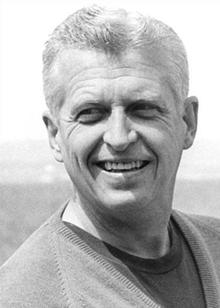
Philip Francis Berrigan was an American peace activist and Catholic priest with the Josephites. He engaged in nonviolent, civil disobedience in the cause of peace and nuclear disarmament and was often arrested.
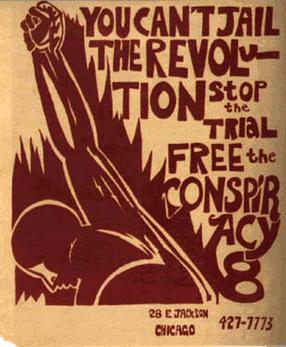
The Chicago Seven, originally the Chicago Eight and also known as the Conspiracy Eight or Conspiracy Seven, were seven defendants – Rennie Davis, David Dellinger, John Froines, Tom Hayden, Abbie Hoffman, Jerry Rubin, and Lee Weiner – charged by the United States Department of Justice with conspiracy, crossing state lines with intent to incite a riot, and other charges related to anti-Vietnam War and 1960s counterculture protests in Chicago, Illinois during the 1968 Democratic National Convention. The Chicago Eight became the Chicago Seven after the case against co-defendant Bobby Seale was declared a mistrial.

The Scottsboro Boys were nine African American male teenagers accused in Alabama of raping two white women in 1931. The landmark set of legal cases from this incident dealt with racism and the right to a fair trial. The cases included a lynch mob before the suspects had been indicted, all-white juries, rushed trials, and disruptive mobs. It is commonly cited as an example of a legal injustice in the United States legal system.

Eqbal Ahmad was a Pakistani political scientist, writer and academic known for his anti-war activism, his support for resistance movements globally and academic contributions to the study of the Near East. Born in Bihar, British India, Ahmad migrated to Pakistan as a child and went on to study economics at the Forman Christian College. After graduating, he worked briefly as an army officer and was wounded in the First Kashmir War in 1948. He participated in the Algerian Revolution, then studied the Vietnam War and U.S. imperialism, becoming an early opponent of the war upon his return to the U.S. in the mid-1960s.

The LaRouche criminal trials in the mid-1980s stemmed from federal and state investigations into the activities of American political activist Lyndon LaRouche and members of his movement. They were charged with conspiring to commit fraud and soliciting loans they had no intention of repaying. LaRouche and his supporters disputed the charges, claiming the trials were politically motivated.
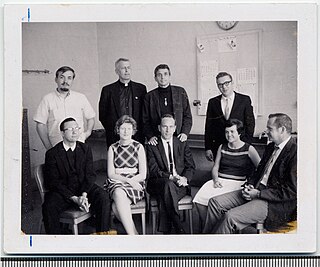
The Catonsville Nine were nine Catholic activists who burned draft files to protest the Vietnam War. On May 17, 1968, they took 378 draft files from the draft board office in Catonsville, Maryland and burned them in the parking lot.
In the United States, the Jencks Act requires the prosecutor to produce a verbatim statement or report made by a government witness or prospective government witness, but only after the witness has testified.
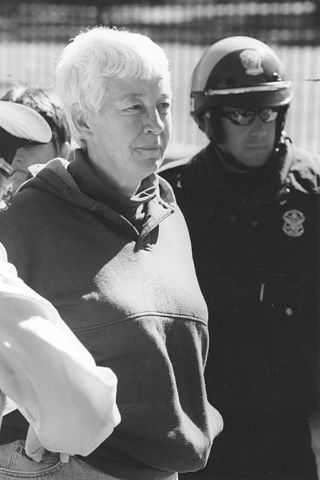
Elizabeth McAlister, also known as Liz McAlister, is an American peace activist and former nun of the Religious of the Sacred Heart of Mary. She married Philip Berrigan and was excommunicated from the Catholic Church. McAlister served prison time for nonviolent acts of civil disobedience.

The Camden 28 were a group of leftist, Catholic, anti-Vietnam War activists who in 1971 planned and executed a raid on a draft board in Camden, New Jersey, United States. The raid resulted in a high-profile criminal trial of the activists that was seen by many as a referendum on the Vietnam War and as an example of jury nullification.

The Fifth Amendment to the United States Constitution creates several constitutional rights, limiting governmental powers focusing on criminal procedures. It was ratified, along with nine other articles, in 1791 as part of the Bill of Rights.
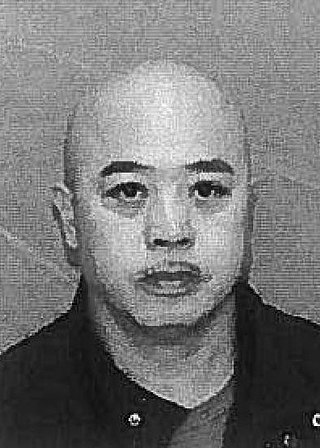
Raymond Kwok-Cheung Chow, nicknamed "Shrimp Boy", is a Hong Kong-born felon with ties to a San Francisco Chinatown street gang and an organized crime syndicate, including the American branch of the Hong Kong-based triad Wo Hop To and the Hop Sing Boys.
United States criminal procedure derives from several sources of law: the baseline protections of the United States Constitution; federal and state statutes; federal and state rules of criminal procedure ; and state and federal case law. Criminal procedures are distinct from civil procedures in the US.
This page lists trials related to the September 11, 2001, terrorist attacks.

Zoia Markovna Horn, born in Ukraine, became in 1972 the first United States librarian to be jailed for refusing to share information as a matter of conscience. Horn, an outspoken member of the American Library Association's Intellectual Freedom Committee, worked at Bucknell University in Lewisburg, Pennsylvania, in the early 1970s. Horn was jailed for nearly three weeks for contempt of court after refusing to testify for the prosecution in the 1972 conspiracy trial of the "Harrisburg Seven" anti-war activists.
Rolando Cruz is an American man known for having been wrongfully convicted and sentenced to death, along with co-defendant Alejandro Hernandez, for the 1983 kidnapping, rape, and murder of 10-year-old Jeanine Nicarico in DuPage County, Illinois. The police had no substantive physical evidence linking the two men to the crime. Their first trial was jointly in 1987, and their statements were used against each other and a third defendant.

The United States Constitution contains several provisions regarding the law of criminal procedure.

The Smith Act trials of Communist Party leaders took place in New York City from 1949 to 1958. These trials were a series of prosecutions carried out by the US federal government during the postwar period and the Cold War era, which was characterized by tensions between the United States and the Soviet Union. The leaders of the Communist Party of the United States (CPUSA) faced accusations of violating the Smith Act, a statute that made it illegal to advocate for the violent overthrow of the government. In their defense, the defendants claimed that they advocated for a peaceful transition to socialism and that their membership in a political party was protected by the First Amendment's guarantees of freedom of speech and association. The issues raised in these trials were eventually addressed by the US Supreme Court in its rulings Dennis v. United States (1951) and Yates v. United States (1957).
Glasser v. United States, 315 U.S. 60 (1942), was a landmark decision of the US Supreme Court on two issues of constitutional criminal procedure. Glasser was the first Supreme Court decision to hold that the Assistance of Counsel Clause of the Sixth Amendment required the reversal of a criminal defendant's conviction if his lawyer's representation of him was limited by a conflict of interest.
The murder of Edward Charles "Teddy" Deegan occurred on March 12, 1965. Deegan was shot and killed in an alley next to an office building in Chelsea, Massachusetts at approximately 9:30 p.m.. In 1967 police charged six men with Deegan's murder, and at trial, the prosecution's primary witness was Federal Bureau of Investigation criminal informant Joseph Barboza. On July 31, 1968, the court convicted Louis Greco, Henry Tameleo, Ronald Cassesso and Peter Limone of Deegan's murder, and sentenced them to the death penalty. Joseph Salvati and Roy French were sentenced to life imprisonment as accessories to Deegan's murder. In 1997 Salvati's sentence was commuted by Governor William Weld, and in January 2001, a judge overturned Peter Limone and Joe Salvati's convictions after uncovered FBI documents proved their innocence. In 2004, Judge Nancy Gertner ruled that federal lawsuits by the families of Louis Greco, Henry Tameleo, Peter Limone and Joseph Salvati had permission to be filed against the United States Government, and in 2007 a landmark decision ordered the United States Government to pay $101.7 million to the accused and their families for wrongful conviction. The use of FBI informants for the wrongful conviction of four innocent men is noteworthy because it unveiled the corrupt activities that occurred in the FBI during the 1960s.













